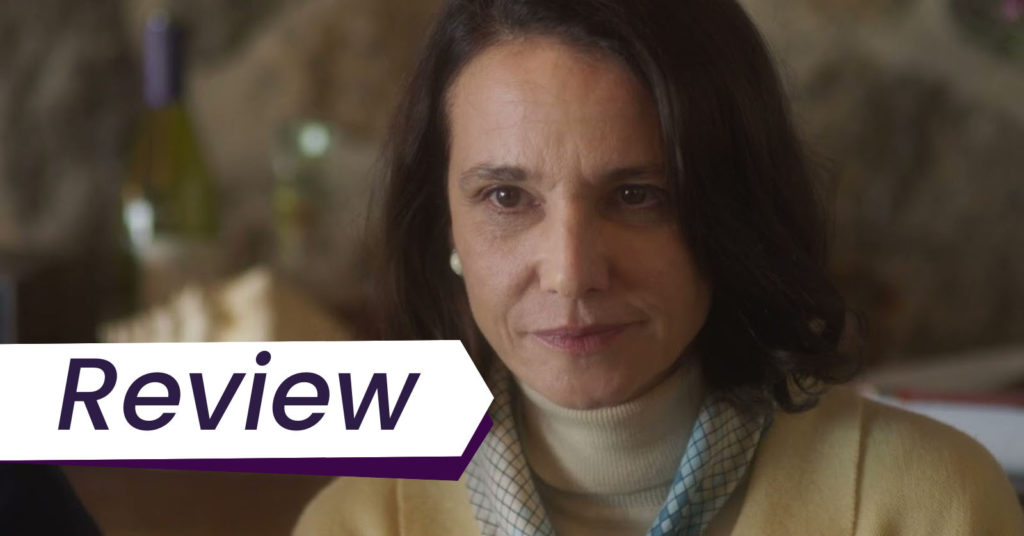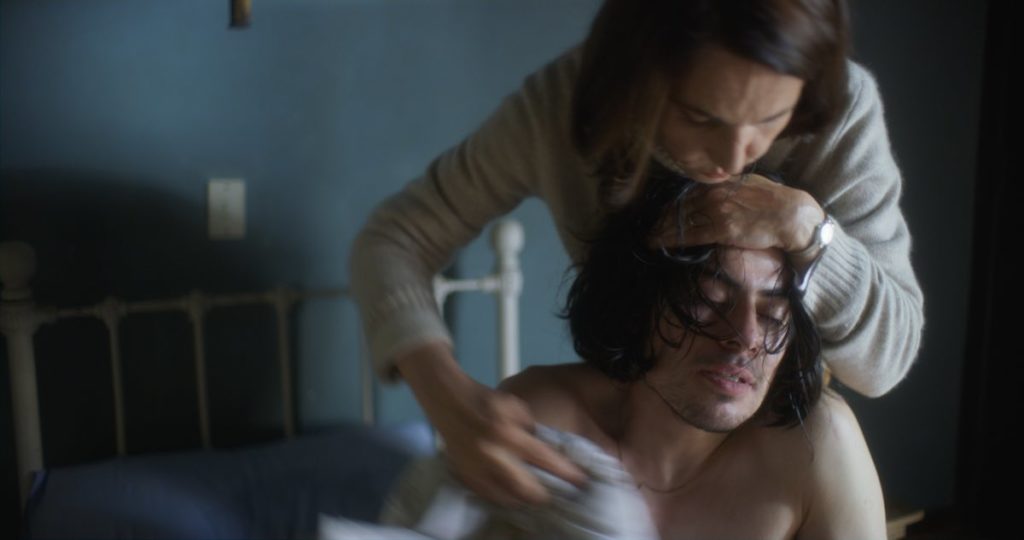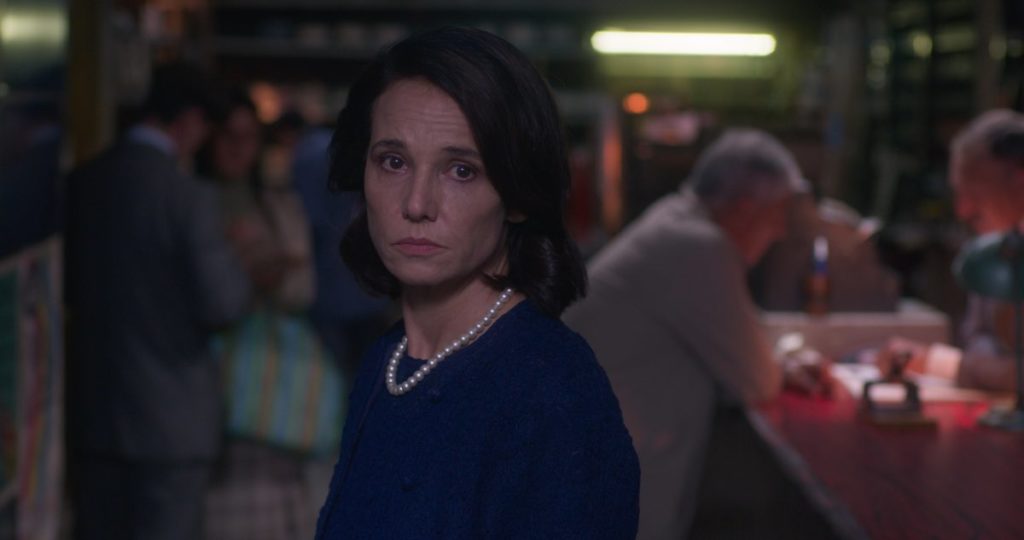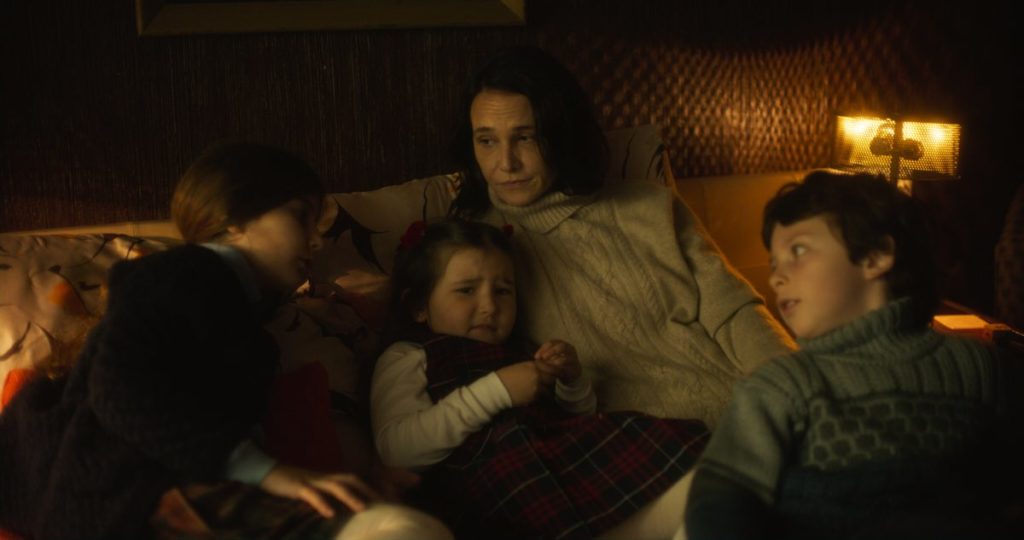Manuela Martelli’s feature debut, Chile 1976, explores one woman’s struggle with misogyny and corruption under Pinochet. The film 1976 screened in the Director’s Fortnight sidebar at Cannes 2022. The film has been retitled Chile 1976 for its North American release by Kino Lorber in the winter.


Listen to the podcast season on Women at Cannes
Over the course of five episodes, we celebrate achievements of women directors at the Cannes Film Festival in Competition and beyond, both this year and in the past.
Discover one film you didn’t know you needed:
Not in the zeitgeist. Not pushed by streamers.
But still easy to find — and worth sitting with.
And a guide to help you do just that.
Manuela Martelli’s debut feature, 1976, is a film defined by a perpetual state of anxiety fueled by government and gender oppression. In the coastal Chilean town of Las Cruces during the third year of Pinochet’s dictatorship, a middle-aged woman named Carmen (Aline Kuppenheim) is busy renovating her family’s beach house. When a local priest, Father Sanchez (Hugo Medina), persuades her into caring for Elías (Nicolás Sepúlveda), a “common criminal” with a gunshot wound, she is unwittingly thrown into a dangerous situation that aligns her with the opposition movement. As time passes and she becomes aware that Elías is actually on the run from Pinochet’s police force, she experiences a quiet revolution as her own life begins to change.
The film Chile 1976, which Martelli co-wrote with Alejandra Moffat, is equal parts character study and taut political drama. Mariá Portugal’s score sets a foreboding tone, regularly thrumming at a low, eerie level, like the sound emanating from a haunted house right before a jump scare takes place. There is no payoff, no cathartic visualisation of fear, only a persistent sense of dread that never fully dissipates.

In the opening scene of the film Chile 1976, Carmen is at a paint store, flipping through a glossy-paged Italian travel book in search of the perfect shade of pink to use as inspiration. Stopping on a photo of the Doge’s Palace at sunset, she exclaims, “This!” Wrapped in shades of dusty pink, pale tangerine, and periwinkle, the Palace looks like the type of place where nothing bad could ever happen; however, prisoners were housed and tortured there for centuries. Much like this picturesque Venice landmark, Carmen’s life is a beguiling façade with something sinister lurking beneath. While a worker mixes up the perfect shade of paint, a struggle takes place outside.
From the start, signs of Pinochet’s evils are present, but only on Carmen’s periphery. With the camera focused on an overhead shot of the paint machine, a muffled woman’s voice cries out that she is being taken. In an extreme close up, the freshly mixed pink paint drips languidly from a wooden stick, directly onto one of Carmen’s navy pumps. At this moment, the only audible sound is the amplified, slow motion drip of the paint, an aesthetic stand-in for bloodshed that is absent but inevitable. The scene also prefigures the ways in which the horrors of Pinochet’s administration will begin seeping into Carmen’s life and become increasingly harder to ignore.
From this initial sequence, Manuela Martelli’s visual language in the film Chile 1976 communicates Carmen’s class position to the audience. This wealthy woman draped in cashmere is relatively shielded from the horrors faced by the woman in the street. She is a bystander to the regime’s violence, but not a victim. It’s only late in the film that we learn her doctor husband, Miguel (Alejandro Goic), is a Pinochet collaborator who financially benefits from the administration’s actions. During a scene on a yacht, Carmen becomes physically ill and vomits as she listens to Miguel and his boss discuss the kickbacks they receive. Everyone thinks she’s seasick when really, she’s disgusted with her own complicity. Carmen never blatantly acknowledges or condones her husband’s actions, but she routinely invokes his name during confrontations with authority figures. Until this scene, which happens two-thirds of the way through the film, it isn’t clear why she does this; once this connection is revealed, it all makes sense.

Even putting Miguel’s ties to Pinochet aside, Carmen seems unhappy with their traditional marriage and her life in general. She wanted to become a doctor, not marry one and raise his children. Throughout the film, there are several mentions of Carmen’s neuroses and the pills she takes to manage them. While watching old home videos one night with her granddaughters and her daughter, Leonor (Amalia Kassai), Carmen identifies the footage as being from the vacation where she “went crazy” and “took off.” Perhaps this is why Leonor often treats her mother with such contempt, belittling her work with the blind by jokingly referring to her as a “literature teacher.” In the same conversation, Leonor pushes Carmen when she makes a comment about being retired. “Retired from what?” she asks. “From raising you two,” Carmen replies. There are shades of The Lost Daughter in this film, where we get the sense that Carmen’s own resentments have exacerbated her mental health issues and led to a strained relationship with her family.
Carmen’s association with Elías is risky, but she’s not oblivious to the looming threat that accompanies this type of political activity, even for someone in her privileged position. From the beginning, she is careful to alter her explanations accordingly. When she calls to ask her husband for antibiotics, she tells him they’re for a girl who had a botched abortion and needs treatment but fears prison. When Miguel refuses to prescribe them, she goes to a hospital and makes up a bullshit story about a fake dog, using his name for credibility. Her behaviour is risky, but it helps that her husband thinks of her as someone with “her head in the clouds” whose days are spent decorating the house and doing volunteer work. He would never suspect that when she goes out, it’s to nurse an “extremist” back to health.

With Elías, Carmen feels useful and respected. Considering the gendered, upper class boredom that has imprisoned her for the majority of her adult life, it’s no wonder she jumps at the chance to do something meaningful. When she learns that he isn’t just a petty thief, but a man trying to escape political persecution, Carmen makes the surprising decision to not only continue helping him, but to dig herself in deeper by trying to arrange a safe house for his extended recuperation. Initially, her assistance is apolitical and motivated by a need for self-worth. When she chooses to stick around after learning the truth about Elías, her actions become political. Instead of using Miguel’s Pinochet connections solely for her own gain, Carmen leverages them to help the opposition.
As Carmen becomes more involved with Elías, the threats against her mount. A worse writer/director would have played up Carmen’s mental health issues, calling into question the validity of her supposed risk, but Martelli doesn’t even flirt with that nonsense. Instead, she establishes upfront the legitimate danger Pinochet’s detractors face, consistently reinforcing it in subtle ways. Early on, the home renovation workers talk quietly about someone they know who was picked up by army patrol and never seen again. In another scene, Father Sanchez tells her about a time right after the coup when he was asked to protect some kids but lost his nerve and reported them. After the navy came to take them away, they were found murdered in Argentina. Over many interactions, Elías remains honest about worst case scenarios. If the wrong person uncovers their connection, death is imminent.
Martelli and Moffat build tension by keeping the audience guessing when (or if) the other shoe will drop as Carmen’s fate becomes more intertwined with Elías’s. Shortly after discovering that Elías only ever speaks to his comrades in person for safety reasons, Carmen talks to her son on the phone from a hotel lobby and hears a pulsating static on her end of the line: a telltale sign that the phone has been tapped. The call, filmed through a porthole window in the lobby, not only reveals Carmen’s face, but the reflection of the proprietor who is sitting in the lobby and watching her with a stern expression. Carmen’s suspicions are never confirmed, but the framing supports them. Later, when she gets stopped by the police at a checkpoint after failing to make contact with one of Elías’s comrades, it feels intentional … as if they’re aware of her illicit activity and attempting to scare the shit out of her until she discontinues it. After several quiet Hail Marys and the mention of her husband, the police dismiss her.
The most blatant display of intimidation occurs after Carmen visits the slums in search of a different church to house Elías. While talking to the priest, her car is broken into and she arrives to find all of her papers haphazardly strewn across the seats. On her drive back home, a car tails her closely with headlights flashing, forcing Carmen to pull over at the first sign of civilization for fear of an altercation. When she stops in at a local restaurant to collect herself, the vibe inside does nothing to quell her nerves. A local man grills her on her nationality, continuously crossing boundaries in an unsettling way. No matter where Carmen seeks comfort, she’s always met with judgement, misogyny, or wariness. Whether government orchestrated or a product of societal norms, she begins to unravel when she realises that there is no one to confide in who will reassure her.
Toward the end of 1976, on the day of her granddaughter’s birthday, Humberto (Elvis Fuentes), a neighbour she’s never met, shows up at the house. In an overhead shot that mirrors the paint mixer in the opening sequence, red splashes of food colouring drop into a vat of white icing, the metal beaters of the hand mixer scraping loudly against the sides of the bowl. Carmen is called in from the kitchen to meet Humberto and to accept the return of her citizenship papers, which presumably went missing after her car break-in and were found next to Chains Beach. In a very pointed and condescending gesture, Humberto grabs her chin and asks, “What were they doing there?” Carmen politely dismisses him with birthday party preparations as her excuse, but his final warning echoes ominously with his face framed in closeup: “Try to be more careful next time. You won’t always be this lucky.”
In a way, Humberto’s words become the film’s overarching message about life in 1976 Chile. Carmen has been spared momentarily, likely due to her husband’s connections, but will disappear in the blink of an eye if she steps out of line again. For all intents and purposes, Carmen is trapped. She can either rebel and go “missing” forever or remain quietly ensconced in her beach house where autonomy is an illusion and real life is in stasis. The goldfish in a jar at the beginning of the film are the perfect metaphor for Carmen. Life may have gotten bigger and more terrifyingly exciting for a brief moment, but she’ll never escape the walls that are slowly closing in on her.







